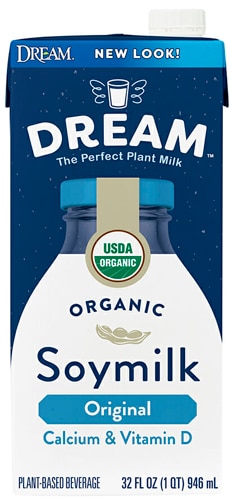Dream Organic Soy Milk Original Description
-
Dream • New Look!
-
The Perfect Plant Milk
-
USDA Organic
-
Calcium & Vitamin D
-
Plant-Based Beverage
Good source of Protein,
Dream™ Soymilk Original with Calcium & vitamin D has 10g of protein per serving to power your day. Enjoy the bright, clean and neutral flavor with no aftertaste. Deliciously satisfying by the glass, over cereal, or as a protein boost in a smoothie.
Why Dream™ Soymilk Original with Calcium & Vitamin D
• Good source of soy protein - 10g soy protein per serving
• Excellent source of Calcium and Vitamins B12, D
• Lactose and dairy free
• Certified Organic
• Non-GMO Project Verified
• Certified Gluten Free
Directions
Shake well. Serve Chilled. Stays fresh 7-10 days in refrigerator after opening.
Free Of
Gluten, lactose, dairy and GMOs.
*These statements have not been evaluated by the Food and Drug Administration. This product is not intended to diagnose, treat, cure, or prevent any disease.
Nutrition Facts
Serving Size: 8 fl oz (240 mL)
Servings per Container: 4
| Amount Per Serving | % Daily Value |
|
| Calories | 120 | |
|
| Total Fat | 5 g | 6% |
|
| Saturated Fat | 1 g | 5% |
|
| Trans Fat | 0 g | |
|
| Polyunsaturated Fat | 3 g | |
|
| Monounsaturated Fat | 1 g | |
|
| Cholesterol | 0 mg | 0% |
|
| Sodium | 130 mg | 6% |
|
| Total Carbohydrate | 9 g | 3% |
|
| Dietary Fiber | 1 g | 4% |
|
| Total Sugars | 5 g | |
|
| Includes 4g Added Sugars | | 8% |
|
| Protein | 10 g | 17% |
|
| Vitamin D | 4.8 mcg | 25% |
|
| Calcium | 310 mg | 25% |
|
| Iron | 1.3 mg | 8% |
|
| Potassium | 470 mg | 10% |
|
| Vitamin A | 150 mcg | 15% |
|
| Vitamin B12 | 1.1 mcg | 45% |
|
| Phosphorus | 300 mg | 25% |
|
Other Ingredients: Organic soymilk (water, organic soybeans), organic cane sugar, tricalcium phosphate, sea salt, organic natural flavor, gellan gum, vitamin D2 (ergocalciferol), vitamin A palmitate, vitamin B12 (cyanocobalamin).
Contains: Soy
Warnings
Not for use as an infant formula.
The product you receive may contain additional details or differ from what is shown on this page, or the product may have additional information revealed by partially peeling back the label. We recommend you reference the complete information included with your product before consumption and do not rely solely on the details shown on this page. For more information, please see our
full disclaimer.
Reviews
View printable version
Print Page
Pumpkin Spice Baked Pancake (Gluten-Free)
[vc_row][vc_column][vc_column_text]Pancakes can be a labor of love. If you want homemade pancakes but don’t feel like babysitting individual flapjacks over the stove, this baked pancake recipe is for you. Not only does it cut down on your work, it’s filled with delicious fall flavors. Pull out the cast-iron skillet, Bob’s Red Mill gluten-free ingredients and preheat the oven. After making a spiced batter with pumpkin puree, you’ll pour it into the skillet and let the oven do the work while you curl up on the couch with a cup of tea.

Pumpkin Spice Baked Pancake (Gluten-Free)

- 1 cup gluten-free 1-to-1 baking flour
- 2 Tbsp. sugar
- 2 tsp. baking powder
- 2 tsp. pumpkin pie spice
- 1/2 tsp. salt
- 3/4 cup milk or plant-based milk
- 1/2 cup pumpkin puree
- 3 Tbsp. butter or plant butter (melted & divided)
- 3 eggs or egg substitute
- 1 Tbsp. apple cider vinegar
Optional: Whipped cream & chopped pecans
- Preheat oven to 425 degrees F and place 9-inch cast-iron skillet in oven.
- In large mixing bowl, whisk together flour, sugar, baking powder, pumpkin pie spice and salt until well blended.
- To flour mixture, add milk, pumpkin puree, 2 Tbsp. melted butter, eggs and apple cider vinegar. Whisk until combined.
- Carefully remove preheated skillet from oven and swirl in remaining butter. Pour in batter and bake 20 minutes or until pancake is golden-brown and cooked through.
- Serve warm with optional garnish, powdered sugar, butter and syrup.
Grab these ingredients and more Bob's Red Mill products at Vitacost.

[/vc_column_text][/vc_column][/vc_row][vc_row][vc_column][vc_text_separator title="Featured Products" border_width="2"][vc_row_inner equal_height="yes" content_placement="middle" gap="35"][vc_column_inner width="1/3"][vc_single_image image="179126" img_size="full" alignment="center" onclick="custom_link" img_link_target="_blank" css=".vc_custom_1729863910728{padding-right: 7% !important;padding-left: 7% !important;}" link="https://www.vitacost.com/bobs-red-mill-gluten-free-pancake-mix-24-oz"][/vc_column_inner][vc_column_inner width="1/3"][vc_single_image image="179125" img_size="full" alignment="center" onclick="custom_link" img_link_target="_blank" css=".vc_custom_1729863923874{padding-right: 7% !important;padding-left: 7% !important;}" link="https://www.vitacost.com/bobs-red-mill-egg-replacer-gluten-free"][/vc_column_inner][vc_column_inner width="1/3"][vc_single_image image="179124" img_size="full" alignment="center" onclick="custom_link" img_link_target="_blank" css=".vc_custom_1729863939647{padding-right: 7% !important;padding-left: 7% !important;}" link="https://www.vitacost.com/bobs-red-mill-1-to-1-baking-flour-gluten-free-44-oz"][/vc_column_inner][/vc_row_inner][/vc_column][/vc_row]







